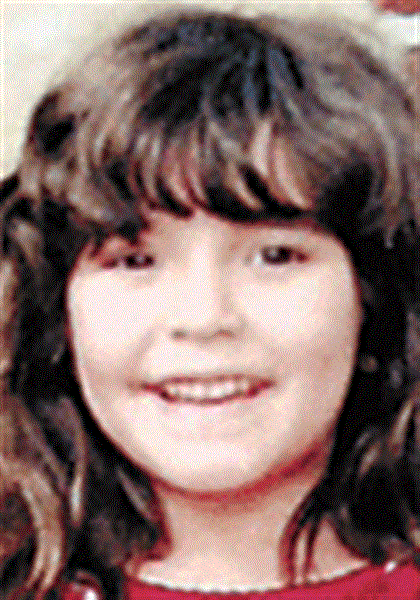
Scientist stuck in bureaucratic bog
1/24/2004
Cancer researcher Dr. Abeer El-Gharbawy's daughter, Aliah, 6.
Joe Gorney-Siminetti just wants his wife back.
“I miss my wife. I love my wife. I want her home,'' the West Toledoan said.
But his wife, Dr. Abeer El-Gharbawy, is trapped in the post-9/11 security maze, unable to return home with her 6-year-old American daughter, Aliah, from a visit to Egypt. Now, Dr. El-Gharbawy is in danger of losing her job as a cancer researcher at the Medical College of Ohio, and her husband fears her daughter is missing too much of first grade.
“This is absolutely insane,'' Mr. Gorney-Siminetti said.
The couple, who married in September, and Dr. El-Gharbawy's daughter went to Cairo Dec. 4 to visit Dr. El-Gharbawy's family. Although Mr. Gorney-Siminetti planned to return to the states in two weeks, his wife, a medicinal chemist, had saved up enough vacation time to visit for the month.
They carried the papers they believed they would need and left for Egypt worry-free.

Cancer researcher Dr. Abeer El-Gharbawy's daughter, Aliah, 6.
Within days of arriving in Cairo, Dr. El-Gharbawy checked at the American Embassy to begin the process of getting her visa to return to the United States.
“It took us almost two weeks to get the appointment,'' Mr. Gorney-Siminetti said. Dr. El-Gharbawy was ushered into the Embassy. Mr. Gorney-Siminetti was told to wait outside.
“I waited six hours for them to tell her no. I waited six hours and she comes out, very upset about the whole thing. I wanted to go talk to somebody. I wanted to go in and talk to the consulate. They refused.''
A few days later, just as Mr. Gorney-Siminetti, a Lucas County sheriff's deputy, was about to fly back to the United States, he learned his wife could be delayed another three to five weeks.
Now, it looks as though even that estimate was optimistic.
His wife calls the American Embassy every day, trying to find out what is happening to her application to return home.
“Every time she calls, they tell her that the computers are down, or they refuse to talk to her about her case,'' the husband says.
A U.S. government official familiar with the case said he was unable to comment on it directly.
“It's basically our hope that this situation gets rectified soon so that they can rejoin each other,” said Greg Palmore, a spokesman for U.S. Customs and Border Protection.
Kelly Shannon, a spokesman for the U.S. State Department's Bureau of Consular Affairs, said there can be added delays for people seeking visas who work or study in sensitive areas, including chemistry. The added security review required for such people is done within 30 days in most cases, she said.
Dr. El-Gharbawy, who received a doctorate in medicinal chemistry from the University of Toledo and has lived in the United States 10 years, works in the cancer laboratory of Dr. Brian Rowan.
“She does very specialized research,'' Dr. Rowan said. “It takes a very long time to train for. It's taken almost two years to train her to do it. She's the only one in this laboratory who can do this work.''
If Dr. El-Gharbawy's work succeeds, it will tell researchers why the breast cancer drug Tamoxifen eventually fails for most cancer patients. Such information could help scientists find ways to keep the drug effective.
“I'll hold the position open as long as I can,'' Dr. Rowan said.
But eventually, he'll have to begin training someone else to do the work. In the meantime, he's trying to find someone who can help her get home.
“We've been calling everyone we can think of,'' Dr. Rowan said. “It's very frustrating.''
Steve Katich of U.S. Rep. Marcy Kaptur's Toledo office says they have contacted various agencies asking that the process be expedited, but has little hope things will move very fast.
“In our experience, post 9/11, we've seen them take no less than two weeks, sometimes six, eight weeks,'' Mr. Katich said. “In the post 9/11 environment, this is not an uncommon delay.''
That's little consolation to Mr. Gorney-Siminetti.
“What really drives me crazy is I understand we have to have homeland security,'' he said. “Nobody wants it more safe for my kids than me. But keeping her over there is not making this country any safer.''
Blade staff writer Ryan E. Smith contributed to this report.